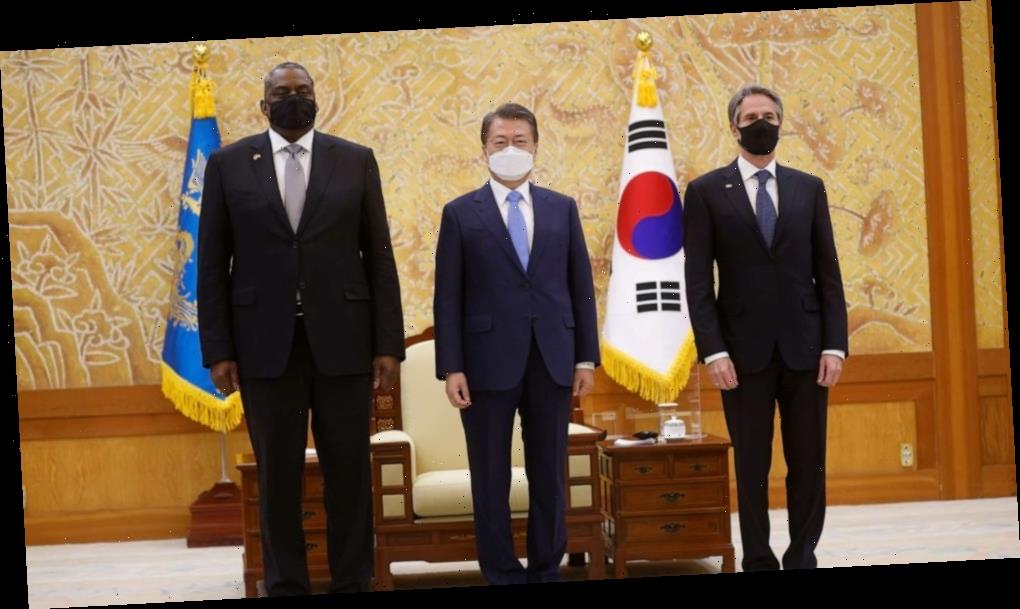SEOUL — The U.S. Secretary of State Antony Blinken urged China to use its influence and “unique relationship” with North Korea to push the communist state to give up its nuclear program.
“Beijing has an interest, a clear self-interest in helping to pursue the denuclearization of DPRK because it is a source of instability,” Blinken said at a press conference in South Korea together with Secretary of Defense Lloyd Austin on Thursday morning, along with their South Korean counterparts Ministers of Foreign Affairs and National Defense, following their so called “two plus two” meeting.
“We are clear eyed about Beijing’s consistent failure. We spoke about how Beijing’s aggressive and authoritarian behavior are challenging the stability and prosperity of the Indo Pacific region,” Blinken said.
Austin added to the message to China, saying, “we have a lot to look forward to as together we address global security challenges and engage in a long term strategic competition with China.”
Blinken is to meet senior Chinese officials in Anchorage, Alaska, on his way back to Washington on Thursday. China’s ambassador to the United States, Cui Tiankai, said that Beijing doesn’t expect the Alaska talks will resolve all the issues between China and the U.S. and “we don’t hold overly high hopes.”
Cui added, however, that he hoped the meeting would be “a start and that the two sides can begin a dialogue process that is candid, constructive and realistic.”
The Ministers and Secretaries reaffirmed the ROK-U.S. Alliance which “has never been more important” amid increasing global threats and vowed to reinforce and cooperate in a wide range of issues such as trade relationship, climate crisis and post-COVID-19 economic recovery, according to their joint statement.
Blinken and Austin are currently on the first overseas trip by cabinet-level officials since Joe Biden took office in January. They visited Japan before arriving in Seoul.
Meanwhile, Blinken told reporters that he is aware of North Korea’s blunt message overnight which described talks with the U.S. would now be a “waste of time” and that they would ignore contact with the U.S. in the future “unless the U.S. rolls back its hostile policy towards the DPRK.”
In a statement carried on its state owned Korea Central News Agency (KCNA), Pyongyang confirmed that the Biden administration has tried to contact them through “several routes,” including New York, since mid-February and that the U.S. “recently requested to contact us by sending emails and telephone messages via various routes” and even through a third country.
But the statement made clear that North Korea is not prepared to respond.
“We don’t think there is need to respond to the U.S.’ delaying-time trick again,” the statement said.
Blinken shrugged it off saying he is currently most occupied, right now, with thoughts of allies and partners.
Regarding concerns over downsized joint military drills in the past three years, Austin said “we have tremendous capability at hand. We’re going to increase that capability by ensuring that we can continue to operate as a, as a combined team,” in close consultations with South Korea.
The ten-day scaled down U.S.-ROK joint exercise this year concluded Thursday with only computer simulations and no field training exercises due to COVID-19. The past few years of exercises under the Trump administration had also been downsized so as to not provoke North Korea during peace talks.
Both sides also pledged to continue transition efforts of wartime Operational Control (OPCON) consistent with the Conditions-Based OPCON Transition Plan (COT-P).
The joint statement emphasized that North Korean nuclear and ballistic missile issues are a priority and that the two countries will work closely together at high-level consultations to support the Biden administration’s North Korea policy review expected to be completed in the coming weeks.
The ROK-U.S.-Japan trilateral cooperation was also discussed with pledges “to continue promoting mutually-beneficial, forward looking cooperation to promote peace, security, and prosperity in the region.”
The two countries will support ASEAN centrality and other regional efforts including the expansion of regional coordination with the Pacific Island countries as well as in the Mekong sub-region.
ABC News’ Hakyung Kate Lee and the Associated Press contributed to this report.
Source: Read Full Article





